Fleurs du Mal Magazine


Or see the index
De wereld kwam niet eerder zo hard binnen in de gedichten van Remco Campert.
Ik zag een jongetje zitten
verwezen op een stoeltje
bedekt met bloed
en asgrauw puinstof
onder een huis weggehaald
met bommen bestookt
door Assads moordenaarstroep
dit gedicht helpt hem niet
maar het is genoteerd
Gevoelig voor de tijdgeest raapt Remco Campert de scherven van de wereld op en smelt ze om tot taal. Hij neemt de poëzie mee naar buiten, waar hij met ‘regels dikbuikig van woorden de oude foxtrot’ danst. Met een open blik bevraagt hij de poëzie, daagt haar uit, onderzoekt haar onbeholpenheid. Zo vernieuwt hij zichzelf. Zijn bevlogen gedichten roepen om vrijheid: ‘open die kooi voor het laatst en voorgoed’.
en nu jij die binnenkomt
ik open als een bloem
een oester een deur
word van ik tot wij
Remco Campert (1929) is dichter, romancier en columnist.
 Voor zijn poëzie ontving hij onder meer de Reina Prinsen Geerligsprijs, de Poëzieprijs van de gemeente Amsterdam, de Jan Campertprijs, de P.C. Hooft-prijs en De Gouden Ganzenveer. In 2015 werd hij bekroond met de Prijs der Nederlandse Letteren.
Voor zijn poëzie ontving hij onder meer de Reina Prinsen Geerligsprijs, de Poëzieprijs van de gemeente Amsterdam, de Jan Campertprijs, de P.C. Hooft-prijs en De Gouden Ganzenveer. In 2015 werd hij bekroond met de Prijs der Nederlandse Letteren.
De vader van Remco Campert was de dichter Jan Campert, die ‘Het Lied der Achttien Dooden’ schreef, zijn moeder de actrice Joeki Broedelet.
Voorjaar 1950 richt Remco Campert met Rudy Kousbroek het tijdschrift Braak op. In juli van hetzelfde jaar wordt de redactie uitgebreid met Lucebert en Bert Schierbeek.
Na het verschijnen van de bloemlezing Atonaal in 1951, onder redactie van Simon Vinkenoog, worden de daarin opgenomen dichters onder wie Gerrit Kouwenaar, Jan G. Elburg en Hugo Claus, aangeduid als de Vijftigers.
Remco Camperts verhalen en romans worden gewaardeerd door een groot publiek en boeken als Het leven is vurrukkulluk (1961) en Tjeempie! of Liesje in luiletterland (1968) staan nog steeds op de leeslijsten.
In 1976 ontvangt hij de P.C. Hooftprijs voor zijn poëzie: ‘Het hele poëtische oeuvre van Remco Campert overziend, is de jury onder de indruk gekomen van de persoonlijke kroniek van de jaren 1950-1970 die erin is neergeschreven. De hachelijke en belachelijke feiten van deze levensperiode zijn door de dichter onvergetelijk geboekstaafd.’
Van 1989 tot 1995 leest Campert met Jan Mulder en Bart Chabot in theaters voor uit eigen werk. Van 1996 tot 2006 schrijft Campert samen met Mulder een gezamenlijke column op de voorpagina van de Volkskrant, CaMu.
Sinds 2012 heeft hij in deze krant een eigen wekelijkse column en daarnaast zijn ‘Somberman’, over het gelijknamige personage dat hij voor het eerst opvoerde in Somberman’s actie, het Boekenweekgeschenk van 1985.
In 2004 verscheen Een liefde in Parijs, zijn eerste roman in meer dan tien jaar, die zeer lovend werd besproken en uitgroeide tot een grote bestseller. Het Parool schreef: ‘Hier is de meester aan het werk.’
In 2006 volgde Het satijnen hart, een weemoedig portret van een schilder die tot op hoge leeftijd niet kan kiezen tussen liefde en kunst. Recent verschenen onder meer de roman Hôtel du Nord (2013), de dichtbundels Licht van mijn leven (2014, met litho’s van Ysbrant) en Verloop van jaren: 40 poëtische notities (2015) en De ziel krijgt voeten (2013), het fotoboek dat hij maakte met zijn dochter Cleo Campert.
Zijn verzamelde columns voor de Volkskrant zijn te lezen in Het verband tussen de dingen ben ik zelf (2012), Te vroeg in het seizoen (2014) en Vandaag ben ik een lege kartonnen doos (2015).
Remco Campert houdt nooit op met schrijven, sinds begin 2016 heeft hij ook een column in Elsevier. In de loop van dit jaar zullen de Somberman-verhalen verschijnen onder de titel Somberman op drift en eveneens een nieuwe bundeling van zijn columns.
Auteur: Remco Campert
Titel: Open ogen
Januari 2018
Druk:1
Hardcover
Nederlandstalig
80 pagina’s
Uitgever: De Bezige Bij
€ 17,99
ISBN10 9023462831
ISBN13 9789023462835
fleursdumal.nl magazine
More in: Archive C-D, Archive C-D, Art & Literature News, Campert, Remco, Remco Campert, Remco Campert

More in: Art & Literature News, Literary Events, Poëzieweek
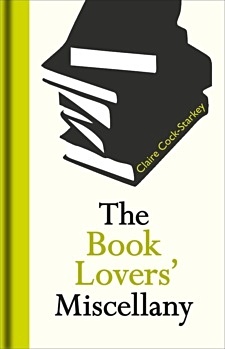 How is ink made? What is the bestselling book of all time? What are the oldest known books in the world? And how does one make sense of the colors found on Penguin paperbacks? The answers to these questions and many more await readers in The Book Lovers’ Miscellany.
How is ink made? What is the bestselling book of all time? What are the oldest known books in the world? And how does one make sense of the colors found on Penguin paperbacks? The answers to these questions and many more await readers in The Book Lovers’ Miscellany.
The Book Lovers’ Miscellany is a cornucopia for bibliophiles. With customary wisdom and wit, Claire Cock-Starkey presents a brief illustrated history of paper, binding, printing, and dust jackets, with a wealth of arcane facts that even the most avid book lovers may be hard-pressed to answer: Which natural pigments were used to decorate medieval bibles? Which animal is needed for the making of vellum? Curious facts are drawn from throughout the history of books and publishing, including many more recent examples, such as a short history of the comic and the story behind the massively successful Harlequin romance imprint Mills and Boon. Readers can explore the output of the most prolific writers and marvel at the youth of the youngest published authors—or lament the decisions of the publishers who rejected books that later became colossal bestsellers. The book also includes a collection of lists, including unfinished novels, books that have faced bans, books printed with mistakes, the most influential academic books of all time, and the longest established literary families.
The perfect gift for every bibliophile, The Book Lovers’ Miscellany is equally well suited to reading straight through or dipping into here and there.
The Book Lovers’ Miscellany
by Claire Cock-Starkey (Author)
Hardcover
ISBN: 9781851244713
Published January 15, 2018
Bodleian Library, University of Oxford
The Bodleian Library at the University of Oxford publishes books related to their collection, in some cases facsimile editons of rare or noteworthy titles. UCP distributes Bodleian Library titles in North America.
fleursdumal.nl magazine
More in: - Book Lovers, - Bookstores, Archive C-D, Art & Literature News, Libraries in Literature, PRESS & PUBLISHING, The Art of Reading
An extraordinary debut from a young Vietnamese American, ‘Night Sky with Exit Wounds’ is a book of poetry unlike any other.
 Steeped in war and cultural upheaval and wielding a fresh new language, Vuong writes about the most profound subjects – love and loss, conflict, grief, memory and desire – and attends to them all with lines that feel newly-minted, graceful in their cadences, passionate and hungry in their tender, close attention: ‘…the chief of police/facedown in a pool of Coca-Cola./A palm-sized photo of his father soaking/beside his left ear.’
Steeped in war and cultural upheaval and wielding a fresh new language, Vuong writes about the most profound subjects – love and loss, conflict, grief, memory and desire – and attends to them all with lines that feel newly-minted, graceful in their cadences, passionate and hungry in their tender, close attention: ‘…the chief of police/facedown in a pool of Coca-Cola./A palm-sized photo of his father soaking/beside his left ear.’
This is an unusual, important book: both gentle and visceral, vulnerable and assured, and its blend of humanity and power make it one of the best first collections of poetry to come out of America in years.
Ocean Vuong was born in a rice farm outside Saigon in 1988. At the age of two, after a year in a refugee camp, he and his family arrived in the US. He is the first in his immediate family to learn how to read proficiently, at the age of eleven. With Ben Lerner as his mentor at Brooklyn College, he wrote the poems that would become this first collection. A Ruth Lilly fellow and winner of a Pushcart Prize, he has received honours and awards from Poets House and the Academy of American Poets. Night Sky with Exit Wounds won the 2016 Whiting Award. Ocean Vuong lives in New York.
Ocean Vuong:
Night Sky with Exit Wounds
English
Publ. Jonathan Cape
Published 4th April 2017
96 Pages
129mm x 197mm x 9mm
ISBN10 1911214519
ISBN13 9781911214519
Paperback
€ 11,46
# more information on website TS Eliot Prize
fleursdumal.nl magazine
More in: - Book News, Archive U-V, Art & Literature News, Awards & Prizes, Eliot, T. S., Ocean Vuong
Aan deze tentoonstelling doen maar liefst 139 kunstenaars uit binnen- en buitenland mee. Ze laten een werk op papier zien van ongeveer A4-formaat, meestal speciaal vervaardigd voor de expositie.
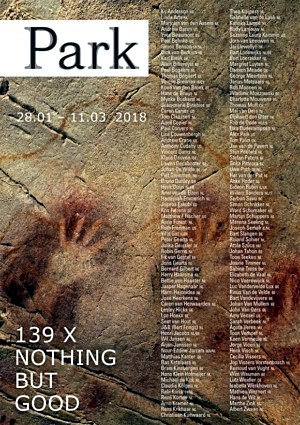 De tentoonstelling is gebaseerd op het blog Nothing But Good, een initiatief van René Korten, Reinoud van Vught (beiden lid van de PARK-werkgroep) en Michael de Kok. Op het blog laten uitgenodigde kunstenaars van over heel de wereld zien dat ze in een traditie staan. Ze verbinden zich met een kunstenaar die niet meer leeft, maar die grote invloed had op hun kunstenaarschap. Niets dan goeds over de doden (Nothing but good should be said of the dead).
De tentoonstelling is gebaseerd op het blog Nothing But Good, een initiatief van René Korten, Reinoud van Vught (beiden lid van de PARK-werkgroep) en Michael de Kok. Op het blog laten uitgenodigde kunstenaars van over heel de wereld zien dat ze in een traditie staan. Ze verbinden zich met een kunstenaar die niet meer leeft, maar die grote invloed had op hun kunstenaarschap. Niets dan goeds over de doden (Nothing but good should be said of the dead).
Naast de bijzondere werken die de deelnemende kunstenaars tonen, is van allen de blogbijdrage met de gekozen inspirator te zien. Bijzondere verbindingen door heel de hele kunstgeschiedenis worden zichtbaar, van de anonieme kunstenaars uit de grotten van Cantabrië tot Ellsworh Kelly. Dit is de tweede tentoonstelling in PARK gebaseerd op het blog.
De opening op zaterdag 27 januari om 16.00 uur wordt verricht door TEMKO, een avontuurlijk ensemble dat op unieke wijze muzikale stijlen combineert. Voorafgaand aan de opening geeft TEMKO vanaf 15.15 uur een kort concert. U bent van harte welkom.
Deelnemende kunstenaars: Ky Anderson (US), Linda Arts (NL), Marjolijn van den Assem (NL), Andrew Baron (US), Yves Beaumont (BE), Paul Behnke (US), Simon Benson (UK/NL), Dick van Berkum (NL), Karl Bielik (UK), Alain Biltereyst (BE), Paul Bogaers (NL), Thomas Bogaert (BE), Valerie Brennan (IE/CY), Koen van den Broek (BE), Hans de Bruijn (NL), Mynke Buskens (NL), Jean-marie Bytebier (BE), Caren Canier (US), Tom Claassen (NL), Aquil Copier (NL), Paul Corvers (NL), Lisa Couwenbergh (NL), Andrew Crane (UK), Anthony Cudahy (US), Vincent Dams (NL), Klaus Dauven (DE), Lieven Decabooter (BE), Johan De Wilde (BE), Piet Dieleman (NL), Bruno Dunley (BR), Henk Duijn (NL/FR), Anet van de Elzen (NL), Hadassah Emmerich (NL), Joseba Eskubi (ES), Kris Fierens (BE), Matthew F Fischer (US), Anne Forest (NL), Ruth Freeman (US), Yifat Gat (IL/FR), Peter Geerts (NL), Julika Geissler (DE), Robin Gerris (NL), Fik van Gestel (BE), Joris Geurts (NL), Bernard Gilbert (BE), Harry Haarsma (NL), Bettie van Haaster (NL), Jasper Hagenaar (NL), Harm Hajonides (NL), José Heerkens (NL), Caren van Herwaarden (NL), Lesley Hicks (UK), Luc Hoekx (BE), Seet van Hout (NL), J&B (Bert Frings) (NL), Henri Jacobs (NL/BE), Wil Jansen (NL), Arjan Janssen (NL), Nour-Eddine Jarram (MA/NL), Matthias Kanter (DE), Bas Ketelaars (NL), Bram Kinsbergen (BE), Hans Klein Hofmeijer (NL), Michael de Kok (NL), Claudia Kölgen (NL), Rabi Koria (SY/NL), René Korten (NL), Arno Kramer (NL), Rens Krikhaar (NL), Christiaan Kuitwaard (NL), Theo Kuijpers (NL), Gabriëlle van de Laak (NL), Katinka Lampe (NL), Rudy Lanjouw (NL), Suzanne Laura Kammin (US), Jorn van Leeuwen (NL), Jai Llewellyn (UK), Bart Lodewijks (NL/BE), Bert Loerakker (NL), Margriet Luyten (NL), Damien Meade (UK), George Meertens (NL), Janus Metsaars (NL), Rob Moonen (NL) , Wladimir Moszowski (BE), Charlotte Mouwens (NL), Thomas Muff (CH), Mai van Oers (NL), Olphaert den Otter (NL), Rob de Oude (NL/US), Elka Oudenampsen (NL), Alex Paik (US), Tom Palin (UK), Jan van de Pavert (NL), Stijn Peeters (NL), Stefan Peters (BE), Tinka Pittoors (BE), Uwe Poth (DE/NL), Har van der Put (NL), Anke Roder (NL), Gideon Rubin (IL/UK), Willem Sanders (NL/IT), Serban Savu (RO), Simon Schrikker (NL), Ward Schumaker (US), Martijn Schuppers (NL), Marena Seeling (NL), Joseph Semah (IL/NL), Bart Slangen (BE), Roland Sohier (NL), Attila Szűcs (HU), Johan Tahon (BE), Toon Teeken (NL), Josine Timmer (NL), Sabine Tress (DU), Elizabeth de Vaal (NL), Nico Vaerewijck (NL), Luc Vandervelde Lux (BE), Rinus Van de Velde (BE), Bart Vandevijvere (BE), Johan Van Mullem (BE), John Van Oers (BE), Amy Vensel (US), Sarah Verbeek (NL), Ágota Veres (HU), Toon Verhoef (NL), Koen Vermeule (NL), Jorge Vicen (ES), Henk Visch (NL), Cecilia Vissers (NL), Jop Vissers Vorstenbosch (NL), Reinoud van Vught (NL), Wim Wauman (BE), Lutz Weidler (DE), Isabella Werkhoven (NL), Mathieu Wernert (FR), Hans de Wit (NL), Marthe Zink (NL), Albert Zwaan (NL).
139 x NOTHING BUT GOOD
tentoonstelling
28.01.2018 – 11.03.2018
Park
Wilhelminapark 53
5041 ED Tilburg
info@park013.nl
+31 (0)6 1941 2596
Twitter.com/ParkTilburg
Facebook.com/Park013
Tijdens tentoonstellingen geopend:
vrijdag van 13.00 tot 17.00 uur
zaterdag van 13.00 tot 17.00 uur
zondag van 13.00 tot 17.00 uur
Toegang is gratis
PARK ligt op 10 minuten loopafstand van het Centraal Station Tilburg in de nabijheid van Museum De Pont. Er is beperkte gratis parkeergelegenheid voor de deur.
fleursdumal.nl magazine
More in: Art & Literature News, Exhibition Archive, FDM Art Gallery, Linda Arts, Park, Paul Bogaers
Als das Letzte Epos hat Peter Handke seinen neuen Roman bezeichnet.
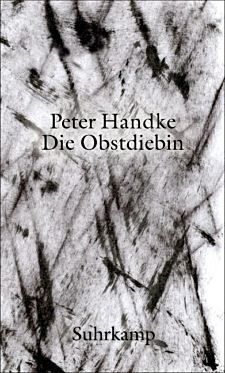 Mit der Niederschrift begann er am 1. August 2016: »Diese Geschichte hat begonnen seinerzeit an einem jener Mittsommertage, da man beim Barfußgehen im Gras wie eh und je zum ersten Mal im Jahr von einer Biene gestochen wird.« Dieser Stich wird, wie der Autor am 2. August festhält, zum »Zeichen«. »Ein gutes oder ein schlechtes? Weder als gutes noch als ein schlechtes, gar böses – einfach als ein Zeichen. Der Stich jetzt gab das Zeichen, aufzubrechen. Zeit, daß du dich auf den Weg machst. Reiß dich los von Garten und Gegend. Fort mit dir.
Mit der Niederschrift begann er am 1. August 2016: »Diese Geschichte hat begonnen seinerzeit an einem jener Mittsommertage, da man beim Barfußgehen im Gras wie eh und je zum ersten Mal im Jahr von einer Biene gestochen wird.« Dieser Stich wird, wie der Autor am 2. August festhält, zum »Zeichen«. »Ein gutes oder ein schlechtes? Weder als gutes noch als ein schlechtes, gar böses – einfach als ein Zeichen. Der Stich jetzt gab das Zeichen, aufzubrechen. Zeit, daß du dich auf den Weg machst. Reiß dich los von Garten und Gegend. Fort mit dir.
Die Stunde des Aufbruchs, sie ist gekommen.«Die Reise führt aus der Niemandsbucht, Umwegen folgend, sie suchend, in das Landesinnere, wo die Obstdiebin, »einfache Fahrt«, keine Rückfahrt, bleiben wird, oder auch nicht?. Am 30. November 2016, dem letzten Tag der Niederschrift des Epos, resumiert Peter Handke die ungeheuerlichen und bisher nie gekannten Gefahren auf ihrem Weg dorthin: »Was sie doch in den drei Tagen ihrer Fahrt ins Landesinnere alles erlebt hatte: seltsam. Oder auch nicht?
Nein, seltsam. Bleibend seltsam. Ewig seltsam.«
Peter Handke wird am 6. Dezember 1942 in Griffen (Kärnten) geboren. Die Familie mütterlicherseits gehört zur slowenischen Minderheit in Österreich; der Vater, ein Deutscher, war in Folge des Zweiten Weltkriegs nach Kärnten gekommen. Zwischen 1954 und 1959 besucht Handke das Gymnasium in Tanzenberg (Kärnten) und das dazugehörige Internat. Nach dem Abitur im Jahr 1961 studiert er in Graz Jura. Im März 1966, Peter Handke hat sein Studium vor der letzten und abschließenden Prüfung abgebrochen, erscheint sein erster Roman Die Hornissen. Im selben Jahr 1966 erfolgt die Inszenierung seines inzwischen legendären Theaterstücks Publikumsbeschimpfung in Frankfurt am Main in der Regie von Claus Peymann.
Seitdem hat er mehr als dreißig Erzählungen und Prosawerke verfaßt, erinnert sei an: Die Angst des Tormanns beim Elfmeter (1970), Wunschloses Unglück (1972), Der kurze Brief zum langen Abschied (1972), Die linkshändige Frau (1976), Das Gewicht der Welt (1977), Langsame Heimkehr (1979), Die Lehre der Sainte-Victoire (1980), Der Chinese des Schmerzes (1983), Die Wiederholung (1986), Versuch über die Müdigkeit (1989), Versuch über die Jukebox (1990), Versuch über den geglückten Tag (1991), Mein Jahr in der Niemandsbucht (1994), Der Bildverlust (2002), Die Morawische Nacht (2008), Der Große Fall (2011), Versuch über den Stillen Ort (2012), Versuch über den Pilznarren (2013).
Auf die Publikumsbeschimpfung 1966 folgt 1968, ebenfalls in Frankfurt am Main uraufgeführt, Kaspar. Von hier spannt sich der Bogen weiter über Der Ritt über den Bodensee 1971), Die Unvernünftigen sterben aus (1974), Über die Dörfer (1981), Das Spiel vom Fragen oder Die Reise zum sonoren Land (1990), Die Stunde da wir nichts voneinander wußten (1992), über den Untertagblues (2004) und Bis daß der Tag euch scheidet (2009) über das dramatische Epos Immer noch Sturm (2011) bis zum Sommerdialog Die schönen Tage von Aranjuez (2012) zu Die Unschuldigen, ich und die Unbekannte am Rand der Landstraße (2016).
Darüber hinaus hat Peter Handke viele Prosawerke und Stücke von Schriftsteller-Kollegen ins Deutsche übertragen: Aus dem Griechischen Stücke von Aischylos, Sophokles und Euripides, aus dem Französischen Emmanuel Bove (unter anderem Meine Freunde), René Char und Francis Ponge, aus dem Amerikanischen Walker Percy.
Sein Werk wurde mit zahlreichen internationalen Preisen ausgezeichnet. Die Formenvielfalt, die Themenwechsel, die Verwendung unterschiedlichster Gattungen (auch als Lyriker, Essayist, Drehbuchautor und Regisseur ist Peter Handke aufgetreten) erklärte er selbst 2007 mit den Worten: »Ein Künstler ist nur dann ein exemplarischer Mensch, wenn man an seinen Werken erkennen kann, wie das Leben verläuft. Er muß durch drei, vier, zeitweise qualvolle Verwandlungen gehen.
Peter Handke
Die Obstdiebin oder Einfache Fahrt ins Landesinnere
EAN: 9783518427576
ISBN: 3518427571
Libri: 3844323
Suhrkamp Verlag AG
November 2017
559 Seiten
gebunden
€34,00
new books
fleursdumal.nl magazine
More in: - Book News, - Bookstores, Archive G-H, Art & Literature News, Peter Handke
The story of how literature shaped world history, in sixteen acts—from Alexander the Great and the Iliad to Don Quixote and Harry Potter
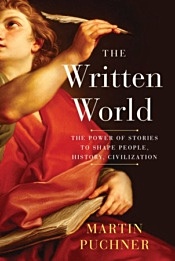 In this groundbreaking book, Martin Puchner leads us on a remarkable journey through time and around the globe to reveal the powerful role stories and literature have played in creating the world we have today.
In this groundbreaking book, Martin Puchner leads us on a remarkable journey through time and around the globe to reveal the powerful role stories and literature have played in creating the world we have today.
Puchner introduces us to numerous visionaries as he explores sixteen foundational texts selected from more than four thousand years of world literature and reveals how writing has inspired the rise and fall of empires and nations, the spark of philosophical and political ideas, and the birth of religious beliefs. Indeed, literature has touched the lives of generations and changed the course of history.
At the heart of this book are works, some long-lost and rediscovered, that have shaped civilization: the first written masterpiece, the Epic of Gilgamesh; Ezra’s Hebrew Bible, created as scripture; the teachings of Buddha, Confucius, Socrates, and Jesus; and the first great novel in world literature, The Tale of Genji, written by a Japanese woman known as Murasaki.
Visiting Baghdad, Puchner tells of Scheherazade and the stories of One Thousand and One Nights, and in the Americas we watch the astonishing survival of the Maya epic Popol Vuh. Cervantes, who invented the modern novel, battles pirates both real (when he is taken prisoner) and literary (when a fake sequel to Don Quixote is published).
We learn of Benjamin Franklin’s pioneering work as a media entrepreneur, watch Goethe discover world literature in Sicily, and follow the rise in influence of The Communist Manifesto.
We visit Troy, Pergamum, and China, and we speak with Nobel laureates Derek Walcott in the Caribbean and Orhan Pamuk in Istanbul, as well as the wordsmiths of the oral epic Sunjata in West Africa.
Throughout The Written World, Puchner’s delightful narrative also chronicles the inventions—writing technologies, the printing press, the book itself—that have shaped religion, politics, commerce, people, and history.
In a book that Elaine Scarry has praised as “unique and spellbinding,” Puchner shows how literature turned our planet into a written world.
Martin Puchner is the Byron and Anita Wien Professor of English and Comparative Literature at Harvard University. His prize-winning books range from philosophy to the arts, and his bestselling six-volume Norton Anthology of World Literature and HarvardX MOOC (massive open online course) have brought four thousand years of literature to students across the globe. He lives in Cambridge, Massachusetts.
The Written World
The Power of Stories to Shape
People, History, Civilization
By Martin Puchner
Hardcover
Oct.2017
448 Pages
$32.00
ISBN 9780812998931
Published by Random House
new books
fleursdumal.nl magazine
More in: - Book News, - Book Stories, Archive O-P, Art & Literature News, NONFICTION: ESSAYS & STORIES, PRESS & PUBLISHING, The Art of Reading
In the years since he first had the idea of prescribing short, powerful poems for all manner of spiritual ailments, William Sieghart has taken his Poetry Pharmacy around the length and breadth of Britain, into the pages of the Guardian, onto BBC Radio 4 and onto the television, honing his prescriptions all the time.
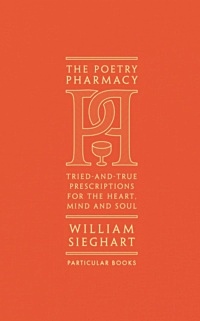 This pocket-sized book presents the most essential poems in his dispensary: those which, again and again, have really shown themselves to work. Whether you are suffering from loneliness, lack of courage, heartbreak, hopelessness, or even from an excess of ego, there is something here to ease your pain.
This pocket-sized book presents the most essential poems in his dispensary: those which, again and again, have really shown themselves to work. Whether you are suffering from loneliness, lack of courage, heartbreak, hopelessness, or even from an excess of ego, there is something here to ease your pain.
– ‘The book is delightful; it rightly resituates poetry in relation to its biggest and most serious task: helping us to live and die well’ – Alain de Botton
William Sieghart
The Poetry Pharmacy
Tried-and-True Prescriptions for the Heart, Mind and Soul
Published September 2017
Hardback
176 Pages
£12.99
Particular Books
Penguin Books Ltd
ISBN: 9781846149542
new books
fleursdumal.nl magazine
More in: - Book Lovers, - Book News, Archive S-T, Archive S-T, Art & Literature News
The Nobel Lecture in Literature, delivered by Kazuo Ishiguro (The Remains of the Day and When We Were Orphans) at the Swedish Academy in Stockholm, Sweden, on December 7, 2017, in an elegant, clothbound edition.
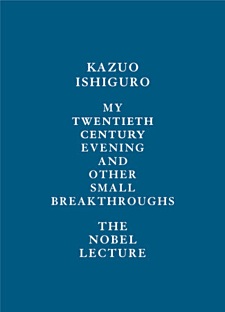 In their announcement of the 2017 Nobel Prize in Literature, the Swedish Academy recognized the emotional force of Kazuo Ishiguro’s fiction and his mastery at uncovering our illusory sense of connection with the world. In the eloquent and candid lecture he delivered upon accepting the award, Ishiguro reflects on the way he was shaped by his upbringing, and on the turning points in his career—“small scruffy moments . . . quiet, private sparks of revelation”—that made him the writer he is today.
In their announcement of the 2017 Nobel Prize in Literature, the Swedish Academy recognized the emotional force of Kazuo Ishiguro’s fiction and his mastery at uncovering our illusory sense of connection with the world. In the eloquent and candid lecture he delivered upon accepting the award, Ishiguro reflects on the way he was shaped by his upbringing, and on the turning points in his career—“small scruffy moments . . . quiet, private sparks of revelation”—that made him the writer he is today.
With the same generous humanity that has graced his novels, Ishiguro here looks beyond himself, to the world that new generations of writers are taking on, and what it will mean—what it will demand of us—to make certain that literature remains not just alive, but essential.
An enduring work on writing and becoming a writer, by one of the most accomplished novelists of our generation.
My Twentieth Century Evening and
Other Small Breakthroughs
The Nobel Lecture
By Kazuo Ishiguro
Hardcover
Dec 12, 2017
64 Pages
$16.95
Published by Knopf
64 Pages
ISBN 9780525654957
new books
fleursdumal.nl magzine
More in: - Book News, Archive I-J, Awards & Prizes, Kazuo Ishiguro, Literary Events

Mercr. 17/01-2018 – 20h
Lecture & rencontre
Kate Tempest
Écoute la ville tomber
Rencontre animée par Clémentine Goldszal
Interprète : Marguerite Capelle
tarif : 5 € / adhérent : 0 € RÉSERVER
Maison de la Poésie
Passage Molière
157 rue Saint-Martin
75003 Paris
www.maisondelapoesieparis.com
Becky, Harry, Leon, Pete. Quatre jeunes gens dans le Londres d’aujourd’hui. Ils ont des rêves, des aspirations, que la ville nourrit puis feint d’encourager pour mieux les broyer. Écoute la ville tomber est le roman d’une génération abîmée par le cynisme mais qui refuse d’abandonner l’utopie. Kate Tempest attrape le lecteur à chaque phrase, avec la furieuse envie de montrer le monde tel qu’il est. Sorti en 2016 en Angleterre, le roman est resté plusieurs semaines dans la liste des best-sellers du Sunday Times, atteignant les 100 000 exemplaires.
Poétesse, musicienne et performeuse mêlant rap, slam, rock & spoken word, Kate Tempest est, à 30 ans à peine, une artiste majeure du temps présent. Comparée à Zadie Smith ou à Virginie Despentes, cette jeune prodige surprend et impressionne, elle cristallise toutes les révoltes qui animent nos temps troubles.
À lire – Kate Tempest, Écoute la ville tomber, traduit de l’anglais par Madeleine Nasalik, Rivages, 2018. Les Nouveaux anciens, trad. de l’anglais par D’ de Kabal et Louise Bartlett, L’Arche, 2017.
À écouter – Kate Tempest, Let Them Eat Chaos, Fiction Records, 2016.
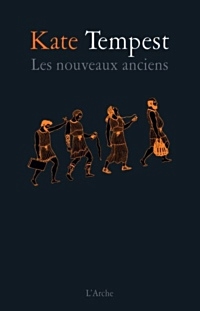 Les nouveaux anciens
Les nouveaux anciens
Kate Tempest
Paru le 18 octobre 2017
Poésie, broché
Editeur Arche
Nombre de pages 72
Traduit de l’anglais par D’ de Kabal et Louise Bartlett
ISBN : 978-2-85181-928-4 – €12
Dans ce poème épique urbain, Kate Tempest revisite par les mythes nos vies modernes désenchantées. Selon elle, les dieux de l’Antiquité resurgissent dans le monde contemporain à travers nos actes quotidiens de violence, de bravoure, de sacrifice ou d’amour. Nous sommes toujours mythiques, nous sommes toujours divins. Elle dépeint ainsi une traversée des âges, de la naissance à la mort de l’être humain, sans occulter ses failles, ses erreurs ni ses regrets. Célébrant l’humain trop humain des supermarchés, des rues, des bars et des open-space, elle s’inscrit dans la tradition d’un hip hop old-school, entre poésie, rap et poésie parlée. Une écriture dramatique puissamment cadencée, avec une rythmique très musicale et un « flow » à couper le souffle.
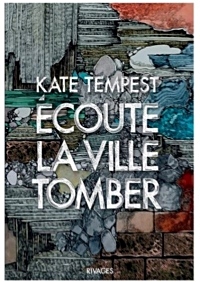 Ecoute la ville tomber
Ecoute la ville tomber
Kate Tempest
Madeleine Nasalik (Traducteur)
Traduit de l’anglais
Collection: Littérature étrangère Rivages
ISBN: 978-2-7436-4199-3
EAN: 9782743641993
Parution: janvier, 2018
400 pages
Format : 14.0 x 20.5
Prix: €22,50
Becky, Harry, Leon. Ils sont jeunes, hésitent entre le cynisme et le besoin éperdu d’utopie. Chacun a des rêves, des aspirations, que la ville nourrit et feint d’encourager pour mieux les broyer. Ce roman résonne des bruits et du rythme de notre époque, dans la prose incandescente de Kate Tempest, star du hip-hop, poétesse et artiste déjà légendaire à 30 ans à peine, admirée par Virginie Despentes, Lola Lafon ou Don DeLillo. Best-seller international, ce livre impose la jeune Anglaise comme une voix majeure de la scène littéraire d’aujourd’hui.
Kate Tempest
Lecture & rencontre
Mercr. 17/01-2018 – 20h
Maison de la Poésie
75003 Paris
fleursdumal.nl magazine
More in: #Editors Choice Archiv, Archive S-T, Archive S-T, Art & Literature News, Kate/Kae Tempest, Literary Events, Maison de la Poésie, Tempest, Kate/Kae, TRANSLATION ARCHIVE
De Academie De Gouden Ganzenveer kent de Gouden Ganzenveer 2018 toe aan de Zuid-Afrikaanse dichteres Antjie Krog.
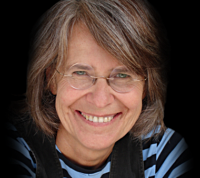 Gerdi Verbeet, Academievoorzitter De Gouden Ganzenveer maakte afgelopen zaterdag de laureaat bekend in het radioprogramma De Taalstaat. De Academie De Gouden Ganzenveer eert Krog als een bijzondere en veelzijdige dichteres, als een uitzonderlijk integer schrijfster en journaliste, en als een begenadigd performer van haar eigen werk.
Gerdi Verbeet, Academievoorzitter De Gouden Ganzenveer maakte afgelopen zaterdag de laureaat bekend in het radioprogramma De Taalstaat. De Academie De Gouden Ganzenveer eert Krog als een bijzondere en veelzijdige dichteres, als een uitzonderlijk integer schrijfster en journaliste, en als een begenadigd performer van haar eigen werk.
De prijsuitreiking vindt plaats op donderdag 19 april a.s. in Amsterdam. Een weerslag van deze bijeenkomst wordt vastgelegd in een speciale uitgave, die in de loop van het jaar zal verschijnen.
De Academie, een initiatief van het bestuur van stichting De Gouden Ganzenveer, kent jaarlijks deze culturele prijs toe. De leden zijn afkomstig uit de wereld van cultuur, wetenschap, politiek en het bedrijfsleven. Met deze onderscheiding wil de Academie het geschreven en gedrukte woord in het Nederlands taalgebied onder de aandacht brengen.
Voorgaande laureaten zijn Arnon Grunberg, Xandra Schutte, Geert Mak, David Van Reybrouck, Ramsey Nasr, Annejet van der Zijl, Remco Campert, Joke van Leeuwen, Adriaan van Dis, Joost Zwagerman, Tom Lanoye, Peter van Straaten, Maria Goos, Kees van Kooten, Jan Blokker en Michaël Zeeman.
Uitgebreide informatie is te vinden op www.goudenganzenveer.nl
De Zuid-Afrikaanse Antjie Krog (1952) is een gelauwerd dichter, schrijver en academicus. Krog debuteerde in 1970 op achttienjarige leeftijd met de dichtbundel Dogter van Jefta. Inmiddels is ze uitgegroeid tot een van de belangrijkste dichters van Zuid-Afrika.
Haar poëzie is persoonlijk, zintuiglijk en sterk geëngageerd: Krog dicht over het moederschap en het ouder worden, maar ook over de diepe verbondenheid en de worsteling met de ongelijkheid en het racisme in haar land. Krog kreeg bekendheid in Nederland door haar vele optredens bij Poetry International, de Nacht van de Poëzie en het festival Winternachten. Talrijke poëzieliefhebbers raakten in de ban van haar ongewone, ontroerende en klankrijke poëzie.
In 1999 publiceerde uitgeverij Atlas een bloemlezing uit haar werk onder de titel Om te kan asemhaal. Daarna zijn haar dichtbundels bij uitgeverij Podium verschenen. Zij schreef ook proza, bijvoorbeeld Country of my Skull (in het Nederlands: De kleur van je hart, 1998/2000), toneelstukken en non-fictie. De roman Mond vol glas van Henk van Woerden en het toneelstuk Mamma Medea van Tom Lanoye vertaalde zij van het Nederlands naar het Afrikaans.
Antjie Krog is buitengewoon hoogleraar Letteren en Filosofie aan de Universiteit van de Westkaap. Haar werk is veelvuldig bekroond, onder andere met de prestigieuze Hertzogprijs, de Reina Prinsen Geerligsprijs, de Pringle Award, de Alan Paton Award. Op donderdag 19 april a.s. neemt zij de Gouden Ganzenveer 2018 in ontvangst.
Laureaat Gouden Ganzenveer 2018: Antjie Krog
foto: Karina Turok
fleursdumal.nl magazine
More in: Antjie Krog, Archive K-L, Archive K-L, Art & Literature News, Awards & Prizes, Literary Events, Racism
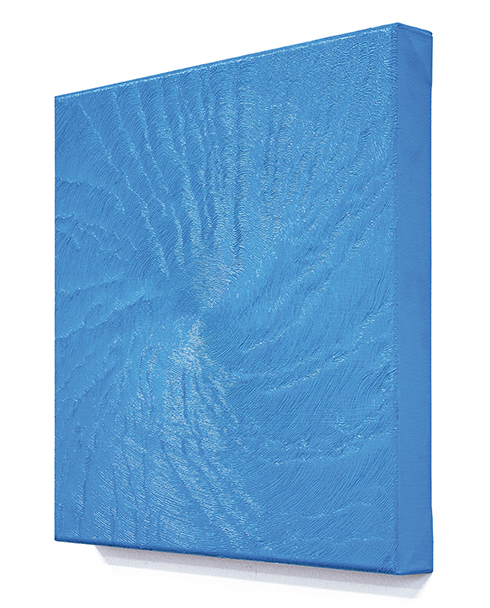
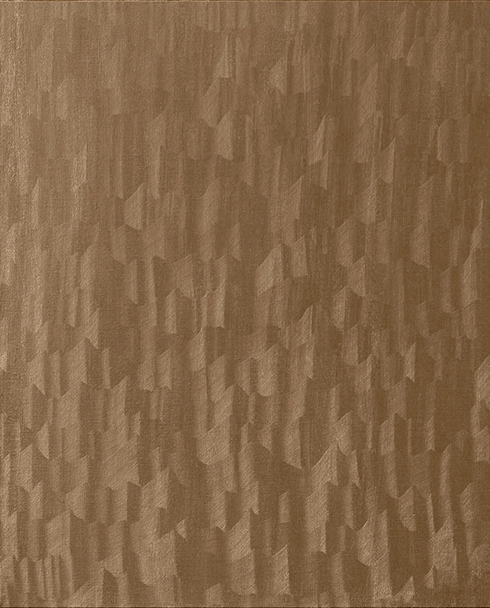
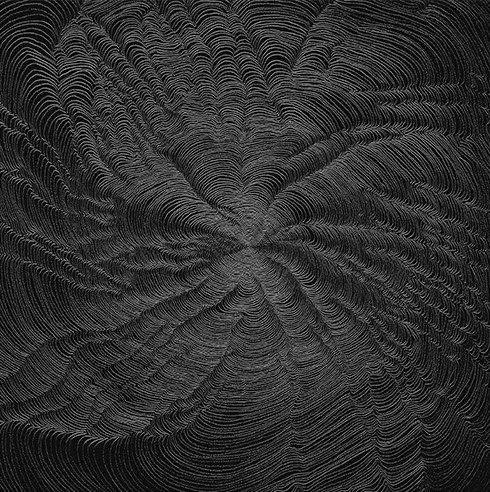
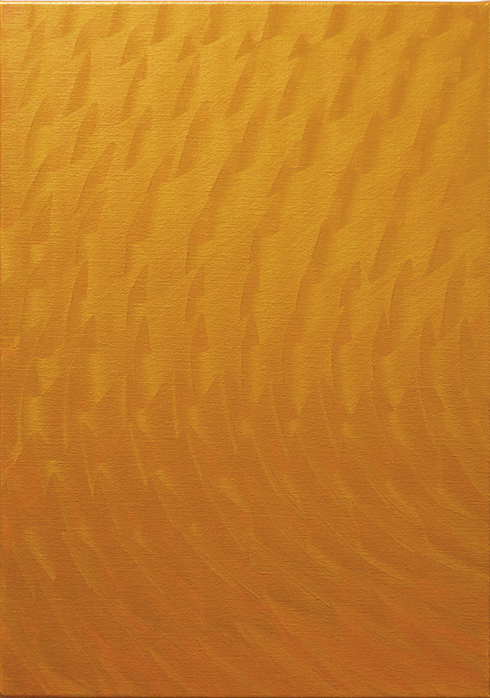
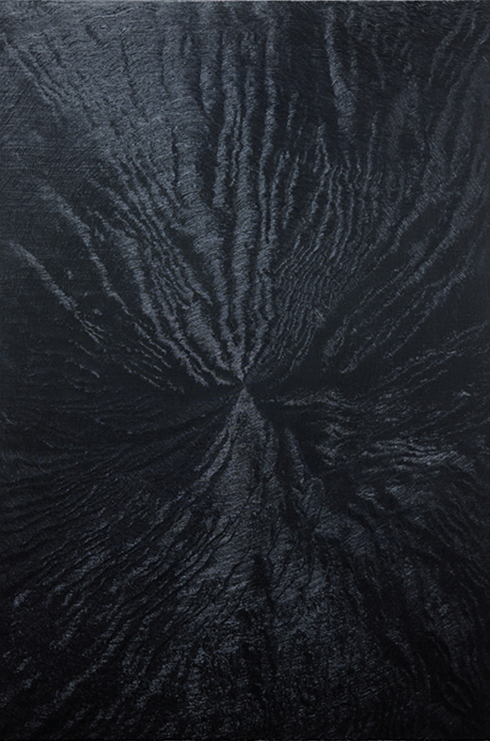

Annemarie Slobbe: “To live is to let go.”
In her work, Annemarie Slobbe (1990) embraces an abstract visual language to reflect the nullity of the human condition. The passage of time is a central component in her paintings and drawings, which consist of rhythmic and repetitive patterns.
To emphasize everything’s state of impermanence she manipulates her materials to create compositions which are receptive of the changing light of day. The transitory characteristics of the work are also experienced by the spectator when one’s viewpoint is altered.
By using these elements she adds a layer of uncontrollability to the work, as a visual reference to the fact that in our own lives many things lay beyond our control. She questions the human struggle against the current of life since it brings more inner rest when one decides to find acceptance of their situation and learns to let go.
Annemarie graduated in 2014 at AKV St. Joost Breda. At the moment her work is represented by Patty Morgan and SBK Amsterdam.
# website www.annemarieslobbe.com
fleursdumal.nl magazine
More in: Annemarie Slobbe, Art & Literature News, Exhibition Archive, FDM Art Gallery
Thank you for reading Fleurs du Mal - magazine for art & literature